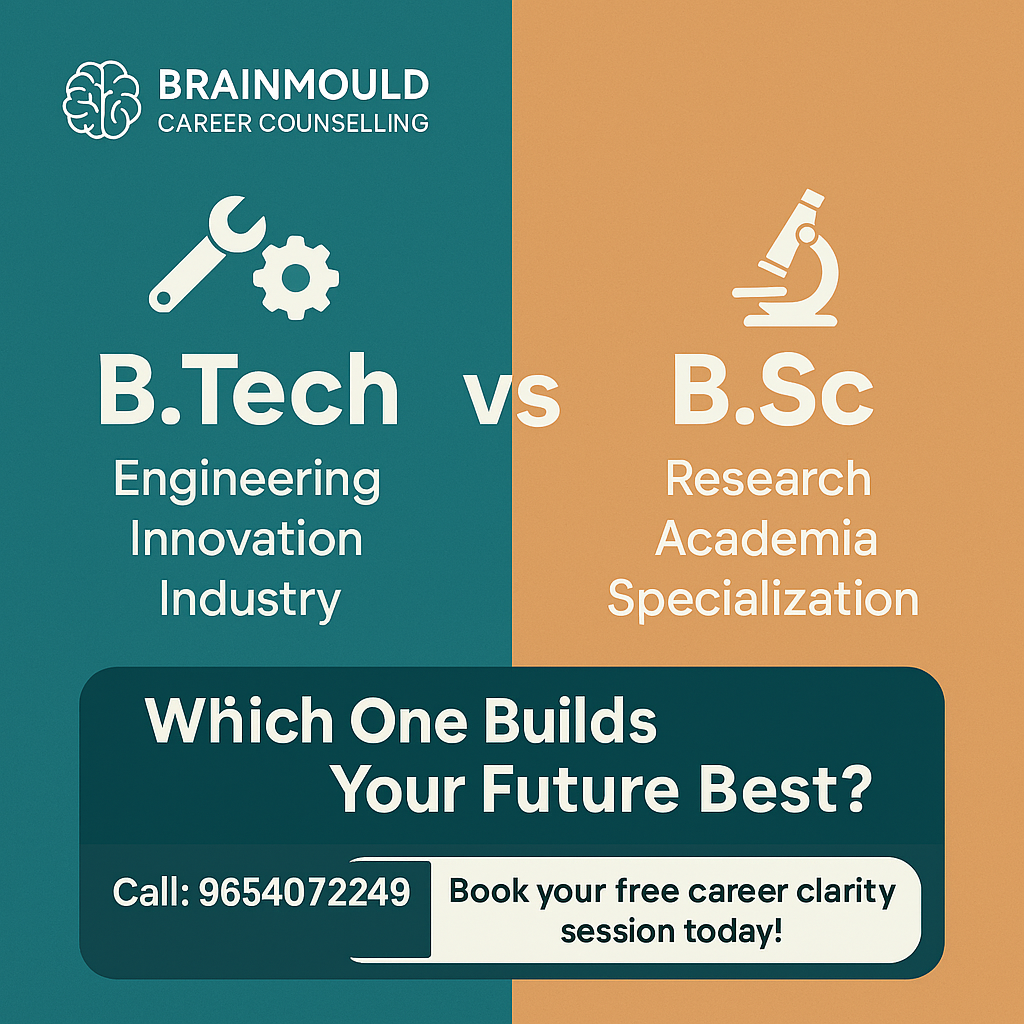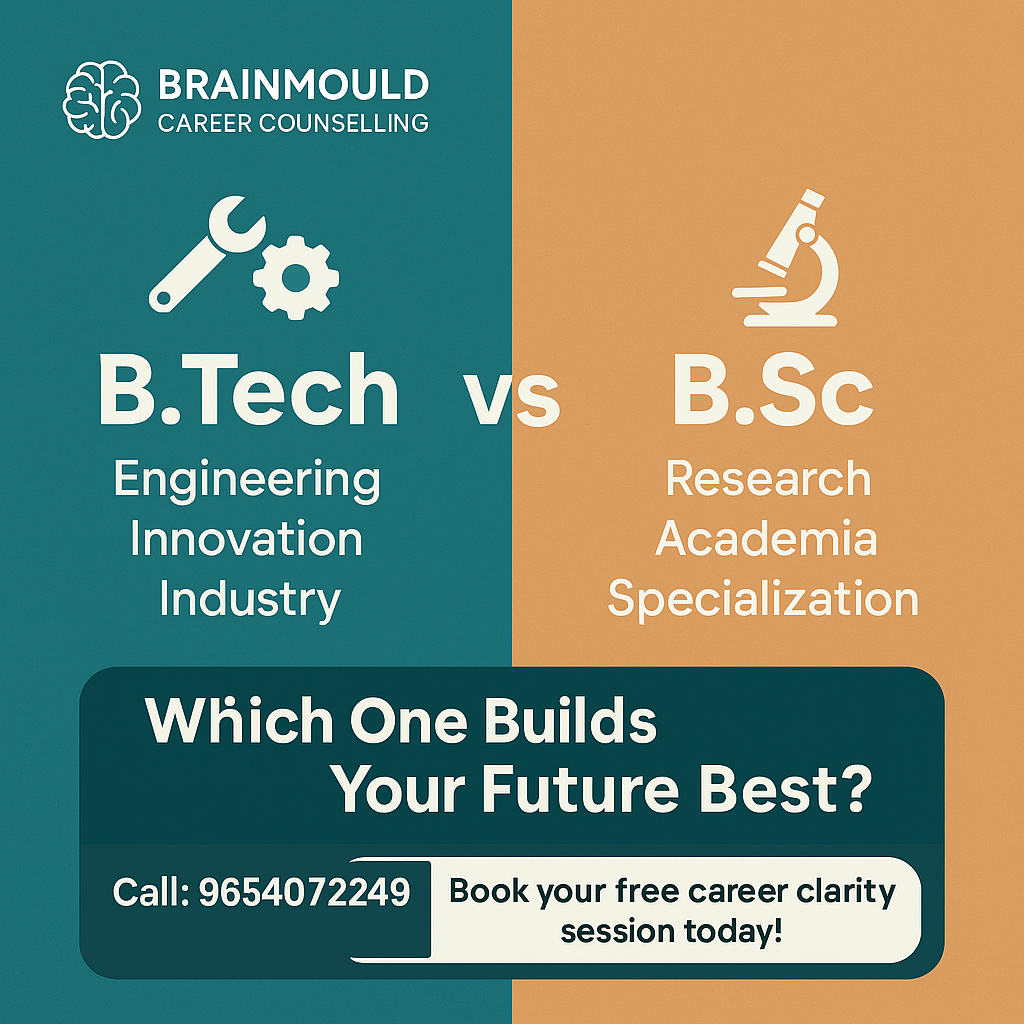Choosing the right course after Class 12 is one of the most important decisions in a student’s life. Many students find themselves debating BTech vs BSc—two of the most popular undergraduate programs in India. Both pathways offer unique opportunities, but the choice depends on your interests, strengths, and long-term career goals.

In this blog, we’ll break down the differences between BTech and BSc in terms of curriculum, career prospects, admission process, and future opportunities—helping you make an informed decision.
Understanding BTech and BSc Degrees
What is BTech?
Bachelor of Technology (BTech) is a four-year undergraduate degree focusing on the practical application of science and technology. It is designed for students interested in engineering, innovation, and industry-oriented careers.
What is BSc?
Bachelor of Science (BSc) is typically a three-year undergraduate program emphasizing theoretical knowledge and fundamental concepts in science. It is ideal for students passionate about research, academia, and pure sciences.
Key Difference: BTech is applied and technical, while BSc is theoretical and research-oriented.
Curriculum & Specializations
| Program | Key Features | Popular Specializations |
|---|---|---|
| BTech | Practical training, labs, projects, internships, industry exposure | Computer Science, Mechanical, Civil, Electronics, Data Science |
| BSc | Strong theoretical foundation, research orientation, lab work in sciences | Physics, Chemistry, Mathematics, Biology, Environmental Science |
BTech prepares you for specific technical roles in industries, while BSc offers flexibility to move into research, higher studies (MSc, PhD), or diverse careers.
Admission Process
- BTech: Admission usually requires competitive entrance exams like JEE Main, JEE Advanced, or state-level engineering exams. Merit in Class 12 also plays a role in some colleges.
- BSc: Admission is mostly merit-based on Class 12 marks, though some universities conduct their own entrance exams.
Takeaway: BTech admissions are competitive and exam-driven, while BSc admissions are comparatively simpler and merit-focused.
Career Opportunities
Career After BTech
BTech graduates are in demand across IT, engineering, data science, manufacturing, and telecom sectors. Common roles include:
- Software Engineer
- Mechanical Engineer
- Data Analyst / Data Scientist
- Civil Engineer
Career After BSc
BSc graduates can build careers in research, academia, healthcare, and environmental sciences. Popular career paths include:
- Research Assistant
- Lab Technician
- Science Teacher / Lecturer
- Environmental Consultant
With higher studies (MSc/PhD), BSc graduates unlock research and academic leadership roles, while BTech graduates often pursue M.Tech or MBA for career advancement.
BTech vs BSc: Which is Better?
- Choose BTech if you:
✅ Enjoy practical problem-solving and technology
✅ Want to work directly in engineering or IT industries
✅ Aspire for high-demand technical roles - Choose BSc if you:
✅ Love scientific theories, research, and analysis
✅ Aim to build a career in academia or research institutions
✅ Plan to pursue MSc or PhD for specialization
Ultimately, the better option depends on YOU—your interest, aptitude, and career vision.
FAQs
Is BTech a graduate or undergraduate degree?
BTech is an undergraduate degree (4 years).
Can I pursue an MBA after BTech or BSc?
Yes, both BTech and BSc graduates can pursue MBA. For BTech students, it adds management expertise, while for BSc students, it opens business and corporate opportunities.
Is BTech harder than BSc?
BTech is more practical and intensive, while BSc is conceptual and research-heavy. Difficulty depends on your aptitude.
Final Thoughts
Both BTech and BSc are excellent career paths after Class 12—but the right choice depends on your strengths, interests, and long-term goals.
When it comes to BTech vs BSc, the core difference lies in their approach and outcome:
- BTech emphasizes practical skills, hands-on training, and industry-oriented learning, making it ideal for students aiming for careers in engineering, IT, and technology-driven industries.
- BSc focuses on theoretical knowledge and scientific foundations, opening pathways to research, academia, and science-based careers.
At Brainmould, we believe the “better” choice depends on YOU—your interests, strengths, and career goals. Our psychometric assessments and expert guidance help you identify which path truly aligns with your future.
Still confused? Don’t worry!
At Brainmould Career Counselling, we use advanced psychometric assessments + AI-driven career mapping to help students discover the best-fit career path. Whether you’re torn between BTech and BSc, or exploring other options, our experts can guide you to make the right choice for your future.
📞 Book Your Career Counselling Session Today with Brainmould and take the first step towards a successful career


Leave a Reply